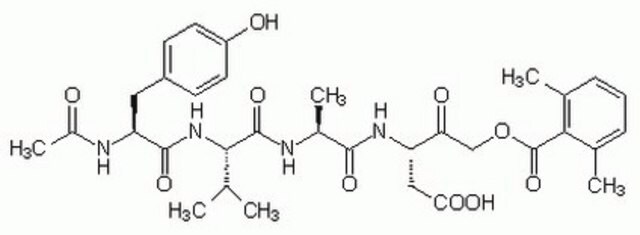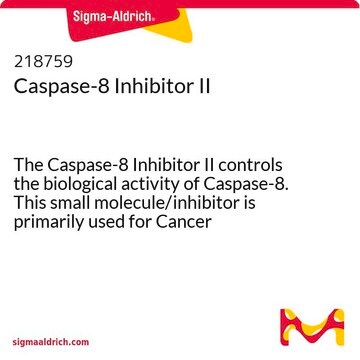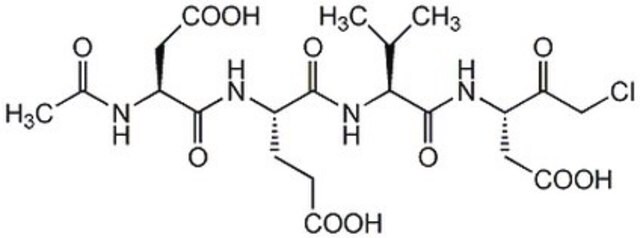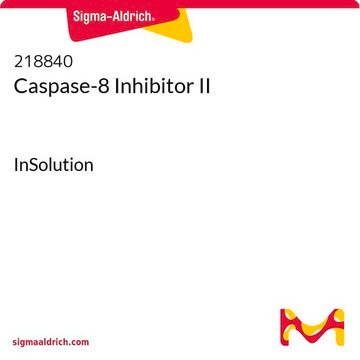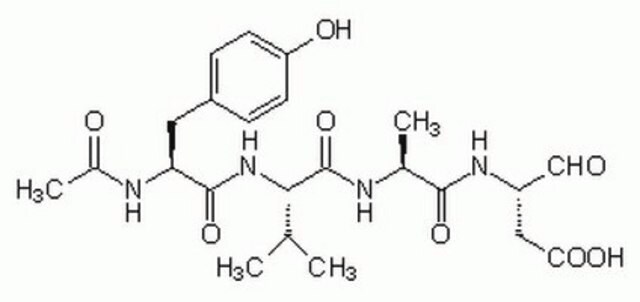218728
Caspase-9 Inhibitor III
The Caspase-9 Inhibitor III, also referenced under CAS 403848-57-7, controls the biological activity of Caspase-9. This small molecule/inhibitor is primarily used for Cancer applications.
Synonym(s):
Caspase-9 Inhibitor III, Ac-LEHD-CMK
Sign Into View Organizational & Contract Pricing
All Photos(1)
About This Item
Empirical Formula (Hill Notation):
C24H35ClN6O9
CAS Number:
Molecular Weight:
587.02
UNSPSC Code:
12352200
NACRES:
NA.54
Recommended Products
Quality Level
assay
≥95% (HPLC)
form
solid
manufacturer/tradename
Calbiochem®
storage condition
OK to freeze
desiccated
color
white
solubility
water: 1 mg/mL
DMSO: 5 mg/mL
shipped in
ambient
storage temp.
−20°C
General description
A potent and irreversible inhibitor of caspase-9 (ICE-LAP6, Mch6). Reported to reduce myocardial infarct size during reperfusion (~70 nM).
A potent, irreversible inhibitor of caspase-9. Reported to reduce myocardial infarct size during reperfusion (~70 nM).
Biochem/physiol Actions
Cell permeable: yes
Primary Target
caspase-9
caspase-9
Product does not compete with ATP.
Reversible: no
Target IC50: 70 nM against caspase-9
Warning
Toxicity: Standard Handling (A)
Sequence
Ac-Leu-Glu-His-Asp-CMK
Other Notes
Mocanu, M.M., et al. 2000. Br. J. Pharmacol.130, 197.
Legal Information
CALBIOCHEM is a registered trademark of Merck KGaA, Darmstadt, Germany
Storage Class
11 - Combustible Solids
wgk_germany
WGK 1
flash_point_f
Not applicable
flash_point_c
Not applicable
Certificates of Analysis (COA)
Search for Certificates of Analysis (COA) by entering the products Lot/Batch Number. Lot and Batch Numbers can be found on a product’s label following the words ‘Lot’ or ‘Batch’.
Already Own This Product?
Find documentation for the products that you have recently purchased in the Document Library.
Hazel Stewart et al.
iScience, 26(11), 108080-108080 (2023-10-20)
The SARS-CoV-2 genome encodes a multitude of accessory proteins. Using comparative genomic approaches, an additional accessory protein, ORF3c, has been predicted to be encoded within the ORF3a sgmRNA. Expression of ORF3c during infection has been confirmed independently by ribosome profiling.
Our team of scientists has experience in all areas of research including Life Science, Material Science, Chemical Synthesis, Chromatography, Analytical and many others.
Contact Technical Service